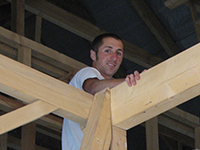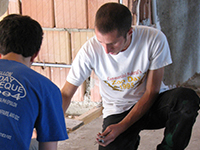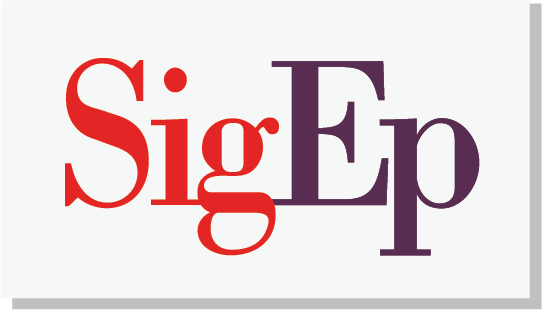 Andrew Weber, Carnegie Mellon ’02, decided that he and his friends, including Carnegie Mellon SigEp brothers Marcus Louie, ’01, Stephen Piercy, ’02, and Michael Schultz, ’03, would have a bachelor party to celebrate his upcoming marriage in 2008 in a way that reflected his deeply held values—an act of community service. That experience came to define his career.
Andrew Weber, Carnegie Mellon ’02, decided that he and his friends, including Carnegie Mellon SigEp brothers Marcus Louie, ’01, Stephen Piercy, ’02, and Michael Schultz, ’03, would have a bachelor party to celebrate his upcoming marriage in 2008 in a way that reflected his deeply held values—an act of community service. That experience came to define his career.
“[It] was a classic affair that began in an unusual way: with hard labor,” said Louie, a computer science graduate now working for a Seattle-based startup called Socrata in Washington D.C. “A dozen of us woke up at dawn on a Saturday morning and spent the day, shoulder-to-shoulder, clearing garbage, weeds, and debris at the East End Cooperative Ministry in Pittsburgh,” he said. For Weber, that was the proper preparation for his wedding a few weeks later.
Religion and service align
Weber began his quest with the church during college. He served as guide and vice president of member development while he studied religion as an undergraduate.
He recalls leading SigEp in a school competition where each fraternity built house-like structures for their spring carnival. “I got a feel for leading a group of varied people with a common vision. This experience helped me grow as a leader, from budget planning to running meetings to hearing others’ input to recognizing volunteers,” said Weber of his time as booth chairman.
After college, Weber spent six months in Hungary where he led home building projects with Habitat for Humanity International. He has served the organization about 10 times as a volunteer or project lead. “Before I volunteered with Habitat, I knew the statistics and numbers of poverty but had no idea of the personal aspect. It is a radical thing to meet new people, to get to know them and make strong connections spanning geography, culture and economics,” he said.
“Near the end of my stay, I clearly saw purpose in my life. I was called to a life of working in communities for a better world,” said Weber, who returned to the U.S. in 2003 to earn his master’s degrees in divinity at Pittsburgh Theological Seminary and social work at the University of Pittsburgh. He is the minister of the Unitarian Universalist Fellowship of Newark, Del.
Prior to his current ministerial duties, Weber served as a chaplain at Children’s Medical Center in Dallas and as youth advisor for the First Universalist Congregation of Ann Arbor in Mich., where he was ordained in 2011.
 A higher calling: servant leadership
A higher calling: servant leadership
Weber wouldn’t call his work philanthropy because he is much more involved in the servant leadership capacity. “[As a philanthropist,] we are raising money and doing well, but in a very distant way which does not open oneself up for transformation or growth.”
That’s why Weber indentifies strongly with servant leadership, or direct participation. “Being physically involved really allows space for both the givers and receivers to meet and make connections. I constantly try to embody Herman Hesse’s ideal of the servant who is leading by supporting others on their own journeys.”
“Andrew makes it a lot easier for all of us to understand that there are many ways throughout each day of our lives that we can be more mindful of how we live. Many people gravitate toward him because of what he stands for,” said Louie, which is passion, resourcefulness, and dedication with hints of perfectionism and stubbornness. “Andrew is a strong community leader who leads most powerfully through his own actions,” Louie said.
Service as a daily practice
“It could be as simple as remembering to turn off the water while scrubbing a pot or including service into your next vacation,” said Louie. He was inspired by Weber’s life ideals to volunteer with Code for D.C., part of the Code for America network, which helps residents engage with their city in more innovative ways. Louie is currently designing a simplified electronic application, which will be used to apply for over 100 different Section 8 housing buildings in the city.
Weber continues his work within the ministry by offering opportunities to donate money and to volunteer in local service projects in order to make a positive difference in the world. Weber challenges undergraduates and alumni to be more intrinsically motivated.
He borrowed a quote from Howard Thurman, an influential civil rights leader, to drive his message home: “Don’t ask what the world needs. Ask what makes you come alive, and go do it. Because what the world needs is people who have come alive.”









Leave a Reply